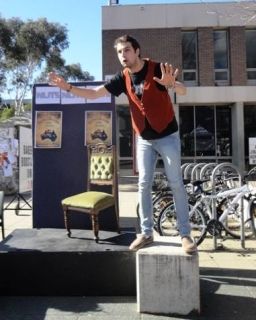Dylan Van Den Berg
Arts can be a lonely thing but I felt a sense of community, a culture of creativity, and an environment of support at the University.
Imagine living in the future where the rivers have dried up and water is a scarcity or travel back in time to see whether love between two Aboriginal young men can withstand colonisation. Or follow a young Palawa man as he embarks on a journey of self and Country.
Playwright, actor and director Dylan Van Berg brings our imagination alive with gripping stories through his plays that create strong identities for Aboriginal and Torres Strait Islanders on stage and write stories that resonate with them while addressing important issues. The Palawa writer is from northeast of Tasmania and through his work, he explores narratives that tell stories about the First Nations people.
The Australian National University (ANU) graduate makes you travel back in time to see the impact of colonisation with his play Whitefella Yella Tree and takes you into the future to see the devastation caused by the climate crisis in his play Ngadjung, which means water in the Ngunnawal language.
His play Ngadjung, staged in Belconnen Arts Centre earlier this year, is set in the future in Ngunnawal country. It is about the environment and addresses the climate crisis and raises the pertinent question of what will happen if we are headed to a time in the future when we run out of water in Canberra. The production was also the directorial debut of the writer who wanted to bring his words to life through direction.
“We are hurtling towards a climate crisis on this planet. It is a possibility that this situation could be a reality mere three or four generations away and I have addressed it through my play Ngadjung,” says Dylan.
“It is also about the land management practices by Aboriginal and Torres Strait Islander people, who have been maintaining the land for thousands of years. Their connection to water is that to their ancestors, and life without water is unimaginable.
“But it does not mean that First Nations people should now bear the responsibility of solving the problem of climate change. The land we have been maintaining for thousands of years has been colonised and requires everyone to come together and work on a solution.
“It doesn’t mean we can’t learn from First Nations experiences but the burden of resolving the issue shouldn’t lie with them. That is the crux of the play.”
Dylan travels back in time to share the experiences of First Nations people with his play Whitefella Yella Tree. It’s a love story between two young First Nations boys who meet under a strange tree growing yellow fruit. They have been given the important job of exchanging information about the “white fellas” who have just arrived in Australia.
“Their friendship turns into a romance challenged by colonisation and its idea of morality and religion. It influences the way they relate to each other and makes one question whether their love can withstand colonisation,” the playwright says.
He has grown up in Tasmania and had questions about where he came from that led him on a journey of self. His production Milk, set on a metaphysical island, takes us on that journey with him which shares the stories of three women from his family and addresses questions about the heritage. Milk was the winner of the 2021 Nick Enright Prize for Playwriting, NSW Premier’s Literary Award.
Dylan was a Bachelor of Arts student and completed his major in Drama. He was a writer before he donned the hat of a director. “Being a writer is exciting and you get an opportunity to create a world with your words. After being a director, one gets an opportunity to bring those words to life on stage. Directing is collaborative and brings various elements of a production together like actors, designers and the production company,” he says.
As a student, Dylan was the artistic director of the National University Theatre Society (NUTS) and explored all aspects of the production of plays.
“It was a great grounding for my professional experience in both theoretical and practical sides of things. Arts can be a lonely thing whether you are writing or directing but there was a sense of community, a culture of creativity, and an environment of support. We produced many plays at the ANU Arts Centre while exploring different ideas to see how it was being received. We would have conversations with people about stories and discourse. That helped shape my direction in the professional journey.”
Dylan believes that students aspiring to be in the industry should take all opportunities that come their way. “The best way to learn something is to get a grounding in your studies but the best way to move into it professionally is it do it. Hone yourself and figure out your own voice. Write a play for yourself if that interests you, don’t wait to get discovered,” he says.
“Just start doing what you love to do”.

